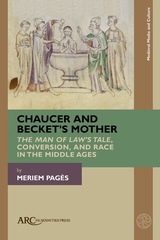
Ben Jonson's contemporaries admired him above all other playwrights and poets of the English Renaissance. He was the “great refiner” who alchemized the bleakest aspects of everyday life into brilliant images of folly and deceit. He was also a celebrated reprobate and an ambitious entrepreneur. David Riggs illuminates every facet of this extraordinary career, giving us the first major biography of Jonson in over sixty years.
The story of Jonson's life provides a broad view of the literary procession in early modern England and the milieu in which Elizabethan drama was produced. Beginning as a journeyman actor, Jonson was soon a novice playwright; his first important play was staged in 1598, with Shakespeare in the cast. He was by turns the self-styled leader of a literary elite, a writer of court masques, the first dramatist to publish his own Works, a royal pensioner, and a genteel poet. As Jonson transformed himself from an artisan into a gentleman, his need to transcend his class origins led him to murder, to his notorious quarrels with Thomas Dekker, John Marston, and Inigo Jones, and to his lifelong rivalry with Shakespeare. Riggs traces the roots of Jonson's aggressiveness back to the turmoil of his childhood and adolescence. He offers new and convincing accounts of Jonson's latent hostility toward his bricklayer stepfather, his reckless marriage to Anne Lewis, and his conflicted relationships with his children.
This vivid portrait synthesizes six decades of scholarship and new historical evidence. Sixty halftones beautifully illustrate the story and capture the spirit of the age. With Riggs' original interpretations of Jonson's masterpieces and lesser known works, Ben Jonson: A Life will prove the standard account of this complex man's life and works for many years to come.

This provocative study provides a radically new perspective on Ben Jonson's comedies. Robert Watson's theory of the “parodic strategy” offers a solution to many of the most perplexing cruxes of Jonson criticism. By betraying the expectations of his characters and his audience, Jonson subsumes and chastises his rival playwrights, and seizes territory within the dramatic genre for his special form of satiric city-comedy.
He builds his complex plots out of the wreckage of more conventional works, in a way that allows him to criticize and combat not only his literary competitors, but also the histrionic tendencies of Renaissance English society. This view of Jonson's notorious borrowings has broad implications for the staging and editing of the comedies, as well as for scholarly criticism. It reveals a Jonson who is more coherent, more consistently funny, and more modernistically aware of the conventions and paradoxes of his medium than has generally been supposed. Watson's approach allows him to reorient major comedies such as Volpone, The Alchemist, and Bartholomew Fair, and to rehabilitate the later works that have commonly been dismissed as “dotages.” Ben Jonson's Parodic Strategy thus provides fresh and vivid insights into Jonson's changing attitudes toward popular culture and toward his own censorious critical persona.
READERS
Browse our collection.
PUBLISHERS
See BiblioVault's publisher services.
STUDENT SERVICES
Files for college accessibility offices.
UChicago Accessibility Resources
home | accessibility | search | about | contact us
BiblioVault ® 2001 - 2024
The University of Chicago Press









